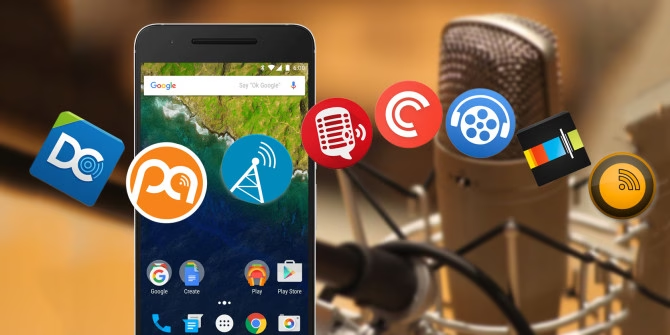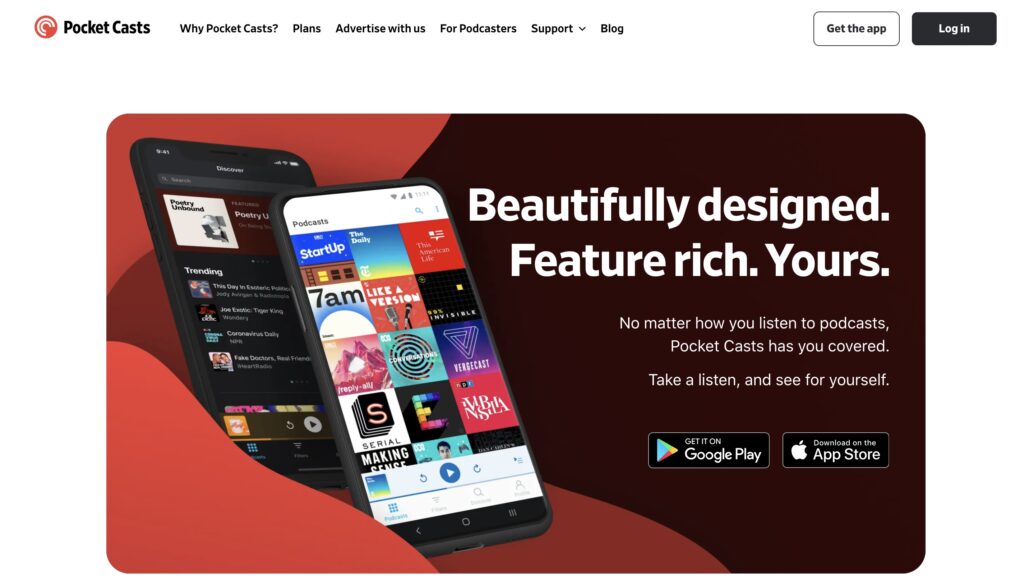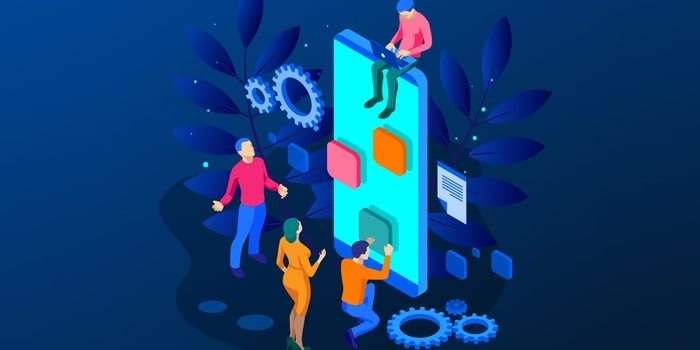
How to Build a Podcast App like Pocket Casts
Interested in how to build a podcast app like Pocket Casts?
In this article, we will answer the most popular questions about podcast app development.
Let's get started!
In this article
- Pocket Casts: An Example of a Podcast App
- Build a Podcast Streaming App like Pocket Casts
- Frequently Asked Questions on Building a Podcast App
Podcasting is now mainstream and attracts tens of millions of people every week. Podcasters like Joe Rogan are now more famous for their podcast episodes than they are for their day jobs. As in the case of Joe Rogan, they can earn millions from their podcast hosting jobs and sponsorships.
Let's see how you can build an innovative app for the podcast industry. We will start by looking at a successful podcast app, including the features it is offering to its audience. This will give you an idea of what your target market expects.
What is a Podcast?
The podcast is an episodic series of digital audio files available for download over the internet to a personal device(iPod, iPad, smartwatch, iPhone, smartphone, digital music player, etc.) or listening online. Nowadays, video podcasts are becoming popular too. Some creators also film video podcast episodes for social media platforms, such as YouTube.

Get a complimentary discovery call and a free ballpark estimate for your project
Trusted by 100x of startups and companies like
Pocket Casts: An Example of a Podcast App

Let’s review Pocket Casts, an example of a podcast app. This innovative podcast app has a free version and there is a premium version. It offers the following features:
- The app has a user-friendly user interface (UI), and it shows subscribed podcast directories or episodes in a tile format.
- Comes with an easy tutorial for those who need help.
- App users can tap on a tile to see the episodes, and this also shows them the various download options.
- Pocket Casts is available on both Android and iOS.
- This app has a built-in audio library feature that helps users sort and categorize their downloaded content and includes cover art.
- Pocket Casts supports video podcast functionality, and it has an auto-download feature.
- It helps to save storage space by automatically cleaning up downloaded episodes.
- Pocket Casts has several useful playback features, e.g., forward and back buttons, configurable time intervals, etc.
- This app offers in-app purchases.
There are other examples of popular podcast apps, and you can find them in “Best podcast apps.”
Build a Podcast Streaming App like Pocket Casts

How do you build a podcast streaming app? I will now explain the steps required for this, which are as follows:
1. Scope definition for the project
As the first step, you need to hire a project manager (PM), an IT architect, and business analysts. This team should conduct discussions with the business stakeholders and collect business requirements.
I recommend that you define the following scope for this project:
- Offer an Android and an iOS app for English-speaking audiences.
- Include podcast-related features such as recording and uploading audio clips, editing tools for digital audio files, etc., like in Pocket Casts.
- The app should offer in-app purchases.
You should also build a website for the online marketing of your app.
2. Prepare for including other language support in future
While creating the app for the English-speaking audience, you should prepare to support more languages in the future. This requires you to follow several best practices, e.g., you should keep your content separate from the code.
These best practices fall within the ambit of app internationalization. You can learn more about this in “The Ultimate Guide to Mobile App Internationalization.”
3. Select an appropriate SDLC model to build a podcast app
You can launch a “Minimum Viable Product” (MVP) with the scope I have recommended above. Subsequently, you can gather feedback from the market and enhance the app.
You will find Agile as the right SDLC model for such projects. This model supports iterative development, and you can learn more about it in “What is software development life cycle and what do you plan for?”.
4. Agree on a development approach
Your PM and IT architect should devise an appropriate development approach, and I recommend the following:
- Use WordPress, the popular open-source content management system (CMS), to build the proposed website.
- Develop native Android and iOS apps since native apps deliver the best user experience and performance.
- Use managed cloud services platforms like Mobile-Backend-as-a-Service (MBaaS) to expedite the project. This helps you to focus on development since you don’t need to manage IT infrastructure.
- Utilize application programming interfaces (APIs) and software development kits (SDKs) to implement core features since this expedites the project.
- Improve your test coverage with the help of a test automation aid.
I have earlier explained the value of such an approach in “What is the best development approach to guarantee the success of your app?”.
5. Form the complete development team to build a podcast app
At this point, you need to form the rest of the project team. You need the following roles:
- UI designers;
- Android developers with Java skills;
- iOS developers with Objective-C skills;
- Testers;
- DevOps engineers.
Are you planning to hire freelancers? I suggest that you hire an expert development team like DevTeam.Space instead, given the coding effort involved in this project. Read “Freelance app development team vs. field expert software development teams” for more insights.
6. Acquire a project management tool to build a podcast app successfully
Project planning and execution are keys to the success of this project. Therefore, you need an effective PM tool. However, let’s first discuss how you should manage this project.
You should consider using the “Scrum” technique in this project since it helps to manage Agile projects. I have explained this technique in “How to build a Scrum development team?” and it has the following characteristics:
- The PM should form a “Scrum team,” which is a cross-functional team where developers and testers work together. A scrum team is led by a “Scrum master,” and the PM performs this role.
- A “Product Owner” provides the business requirements in a document named the “Product Backlog.”
- The team estimates the requirements and schedules them in “Sprints,” i.e., iterations.
- A scrum team conducts “Daily stand-up meetings” to discuss the project status.
- The business stakeholders review the app in a “Sprint review meeting” and approve it, provided the app meets the requirements.
- The scrum team also conducts a lessons-learned exercise named the “Sprint retrospective meeting” after each sprint.
I recommend that you use Asana in this project, which is a robust tool for managing Agile projects.
Hire expert developers for your next project
1,200 top developers
us since 2016
7. Sign up for an MBaaS platform
You need an MBaaS platform to expedite the development of the mobile app. As I had explained in “How to choose the best Mobile Backend as a Service (MBaaS)?”, MBaaS providers offer several advantages, e.g.:
- MBaaS providers handle cloud infrastructure, persistent storage, etc. This eliminates the time-consuming tasks of building and managing the mobile backend. Therefore, you can focus on the front end.
- Using an MBaaS platform makes it easy to secure your mobile app. Moreover, you will find it easy to implement features like user management and push notifications.
- You can easily integrate 3rd party APIs when you use an MBaaS platform.
- MBaaS providers help you to scale your mobile app.
I recommend that you use AWS Amplify, i.e., the MBaaS offering from AWS.
You can also use the same AWS account to host your proposed WordPress website. Amazon Lightsail is the appropriate AWS offering for this since it enables secure and reliable WordPress hosting. Lightsail allows you to host your WordPress site on a virtual private server (VPS).
8. Find a suitable WordPress theme for the proposed website
Procuring a suitable WordPress theme will help you to create a website with a professional look & feel. I recommend “Megaphone – Audio podcast WordPress theme” for this purpose since it’s suitable for Podcasting businesses.
It’s a fully responsive theme that offers excellent layouts and templates. Megaphone has excellent documentation, and you can find it on its website.
Use WooCommerce, which has a powerful plugin for implementing eCommerce on your WordPress sites. It’s easy to configure, thanks to the comprehensive documentation available on its website.
9. Get an API solution for searching podcasts
Users of your proposed podcast app will need to find podcasts of their choice. Subsequently, they will download and listen to them. While your development team needs to code the download and playback functions using the device features, you need the capability to search for podcasts.
I recommend that you use an API solution for this, and Listen API is an excellent solution. This API is from Listen Notes, which is a powerful podcast search engine.
Your app will be able to access its vast podcast database with over 700,000 podcasts and millions of episodes. “Listen API” is fast and scalable. Moreover, you can get reliable customer support.
Read “Listen API docs”, which will guide you to use the API effectively. You can read “Listen API pricing & plans” to understand its “Pay-as-you-go” model.
10. Procure an eCommerce API solution
You need an eCommerce API solution for quickly implementing the in-app purchase feature, therefore, I recommend that you use BigCommerce. The BigCommerce API solution will help you to implement all key features like cart, catalog, etc.
BigCommerce provides extensive learning resources for its APIs, and you can access them on the BigCommerce Help Center. Read the BigCommerce pricing FAQs page to study its pricing plans and billing options.
11. Find a payment gateway API solution
Your app needs a payment gateway integration. Therefore, I suggest that you use Stripe. It has a robust API/SDK solution, and you can consult the following resources to use it:
- Stripe documentation;
- Its “Payments overview” webpage;
- The “API reference” page on the Stripe website;
- Its iOS SDK documentation on the “Stripe on iOS” webpage;
- The “Stripe on Android” SDK guide.
Read “Pricing built for businesses of all sizes” to understand the pricing plans of Stripe.
12. Get a bulk SMS API solution
A podcast app needs the “push notifications” feature to engage its users, and you should consider using a bulk SMS solution to implement this feature. Twilio has the right API solution for this, and that’s its “Programmable SMS” offering.
You can read “Messaging Services and Copilot” to learn how to use the programmable SMS API. Check out the Twilio pricing page before you sign up.
13. Find a mobile device lab on the cloud for test automation
The mobile apps need to work on all devices. Therefore, it’s important that you test them against a wide range of mobile devices. You need a mobile device lab on the cloud for this, and Experitest offers just that.
Its “Mobile device & browser lab” has thousands of browser-device combinations. Experitest also offers “SeeTest reporter,” which helps your testing team to get excellent test reports and analytics.
Hire expert developers for your next project
14. Designing the website and the mobile app UI
This step involves the following:
- The UI design team should follow the WordPress theme documentation to design the website.
- They need to consult the “Human Interface Guidelines” to design the UI for the iOS app.
- The team needs to follow the “Material design” guidelines to design the Android app UI.
15. Developing the Android app
You should code the Android app using Java; moreover, you should use Android Studio, the popular IDE for Android development. This involves the following:
- Integrate the SDKs/APIs from Stripe, BigCommerce, Twilio, and “Listen API” in your code.
- Use Espresso and the Experitest mobile device lab to test the app.
- Publish the app to Google Play by following the instructions in “Publish your app.”
16. iOS app development
The next step is to develop the iOS app, and this involves the following:
- Code the app using Objective-C, and use Xcode as your IDE.
- Integrate the above-mentioned SDKs/APIs in your app.
- Test the app using XCTest and the Experitest mobile device lab.
- Read “Submit your apps to the App Store,” and publish the app to the Apple App Store by following the relevant instructions.
Your MVP is ready! All you need now is to find a great host and co-host. Congratulations!
Planning to Build a Great Podcast App?
According to a Deloitte “Technology, Media, And Telecommunications Predictions 2020” report, the podcasting business could grow to more than $3.3 billion by 2025."
This is clearly a lucrative industry that has a lot of room for innovation. This is why companies are rushing to get in on the act. If you, as a business CEO or CTO, are planning to build a podcast app, you are making a viable business decision, given the opportunities in the field.
You can expedite your project to build a podcast app with the help of this guide, platforms, tools, and frameworks. However, developing a podcast app requires a good deal of coding, and I recommend that you engage a well-established software development company for such a project.
Read “How to find the best software development company?” before you select such a development partner.
If you are still looking for a credible software development partner, why not contact DevTeam.Space to work with its high-quality software developers community. These mobile app developers will help you build a podcast app using the latest technologies.
Send us your initial podcast app feature specifications via this quick form and one of our account managers will get back to you to discuss further details.
Further Reading
Here are a few articles that might also interest you:
Frequently Asked Questions on Building a Podcast App
Apart from Google Podcasts and Apple Podcasts, the most popular listening platforms with podcast content include:
• Spotify
• Podbean.
• Stitcher.
• Laughable.
• TuneIn Radio
Advertising and paid subscriptions are the primary sources of income for these kinds of apps.
DevTeam.Space is the best place to find app developers. All its developers are experts and are vetted for excellence.


